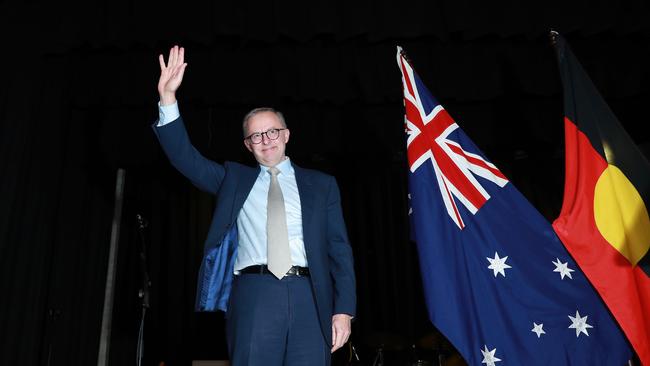Albo’s success on fiscal test will decide his government’s future
But where does that leave the reform debate in this country? Dead, buried and cremated is probably the answer.

The challenges are enormous: rising inflation, rising debt, rising interest rates. These are the known knowns. Throw in energy supply and cost pressures as well as uncertainty on rents and house prices, and winning the election almost presents as a poisoned chalice. Of course, politicians want power and they know that residing on the wrong side of the treasury benches is a worse fate.
The structure of the national economy is no longer fit for purpose. The Coalition sat on its reforming hands through three terms in office. Tax and federation reforms are desperately needed to ensure we can cover the costs of what people expect from government, and that’s before we even get serious about balancing the budget and paying down debt.
Neither side of the major party divide has credibility when it comes to fiscal conservatism. Liberals refer back to the Howard era to brandish their economic credentials, but after nearly nine years in office the current generation of Liberals tripled the debt. Labor can be proud of the all-important micro-economic reforms from the Hawke and Keating era, but it had nothing to do with the current crop of MPs. They’ll need to build their own legacy.
New governments get a small window to embark on serious reforms: the first budget, the first term, perhaps the first half of a second term if they take reforms to their first bid for re-election, as John Howard did when arguing for the introduction of the GST at the 1998 election. After that, survival becomes the benchmark for most administrations as they seek to elongate time in power.
Politically speaking, reforms in the second half of a government’s lifespan are especially difficult, which is why they are so rare. Albanese’s government may face more obstruction in the Senate than it otherwise would have courtesy of his decision to decrease crossbench staffing allocations. Lower house teals are complaining loudly, but they have little power. Senate crossbenchers do. If Labor develops an agenda the crossbench might stifle it out of spite.
The mini-budget in October and the real thing in May next year are crucial markers for this new Labor government.
Albanese may be the victorious Prime Minister who can take the lion’s share of credit for getting Labor over the line, but Jim Chalmers’ performance early on as Treasurer will set this government up as a success or failure. Penny Wong, Don Farrell and Katy Gallagher’s negotiation skills in the Senate also will be important.
Before jumping into major reforms, we need to have a serious debate about what Australians want and expect from government. The answer appears to be “more”, but so far the community desire for government supports, services and safeguards hasn’t been matched by an acceptance that paying for it all will require higher taxes – unless debt continues to increase, which is unsustainable as interest rates rise.
The only taxes Labor has pledged to increase are on multinationals. Few will shed a tear for the impact that may have on the bottom line of business, but if the adjustment sends some businesses offshore we’ll notice the unintended consequences. Multinationals play nations off against one another to reduce their tax burden.
The early signs are that Chalmers is preparing Australians for spending cuts come October. I’ve long been a small-government proponent, but I question whether the population agrees or ever really agreed with the philosophical mantra. Exactly where spending restraint is put in place will be quite the spectacle. Labor can’t cut spending to health, universities, schools, childcare, disability support, aged care or broader-based welfare support. The expectation is that more, not less, will be spent in these areas. Claims that rorts and entitlements will be cut never amount to much fiscally. It’s more of a political marketing exercise.
The stage three income tax cuts, when they come into effect, will be a hammer blow to government coffers. They also will remove the capacity for bracket creep to repair the budget across the medium term, a trick both sides of politics have used to cover up their failure to reform.
Australia is too reliant on income taxes, so at one level cuts already legislated are a good thing. But the stage three cuts aren’t targeted at lower-income earners; quite the opposite. Which is why you see the Greens pushing for them to be reversed. This presents a political problem for Labor to go with the fiscal challenges. The only way to overcome that is by embracing wider tax reform, or by just letting debt continue to accrue.
Moving away from income taxes and towards taxing wealth is the solution. But that would involve considering changes to the GST (already ruled out by Labor) and embracing reforms taken to the 2019 election such as reduced capital gains tax exemptions and negative gearing deductions.
It is hard to see Albanese authorising a first order of business that includes embracing the former agenda of his predecessor as Labor leader, Bill Shorten. I suspect we can rule that out. So where does that leave the reform debate in this country? Dead, buried and cremated is probably the answer unless Chalmers and his finance team have some innovative ways of modernising the economy.
Some of the social reforms slatted at the election do have the potential to lift productivity, which will help grow the pie, as Paul Keating was fond of calling it. But these sorts of changes take years to have flow-on fiscal dividends, so we won’t be able to assess their impact properly for a long time.
To be sure, promises to improve workplace participation, as worthy as they might be, could be cancelled out by extra imposts on business in the workplace relations space. Labor has an ideological promise to the unions to keep, and the Liberals certainly don’t have what it takes to meaningfully challenge any changes coming.
Finally, as a general rule good government requires good opposition because without the robustness of parliamentary democracy governments can’t be trusted to get the big decisions right. It is no coincidence that when Scott Morrison cancelled parliament during the pandemic he went on to butcher his handling of hotel quarantine and the vaccine rollout. It is also no coincidence that the most successful era of micro-economic reforms, in the 1980s, saw a solid degree of bipartisanship.
The opposition really isn’t all that impressive. Peter Dutton lacks the cattle on his frontbench to hold this new government to account meaningfully. And his strongest political characteristic is his capacity to be adversarial, which could help him wreck the joint and return to power but it won’t elevate reform debates or the reforming outcomes such debates lead to.
Peter van Onselen is a professor of politics and public policy at the University of Western Australia and Griffith University.







When parliament returns at the end of this month for the first time since the federal election we will get a clearer sense of what sort of government Anthony Albanese will lead.